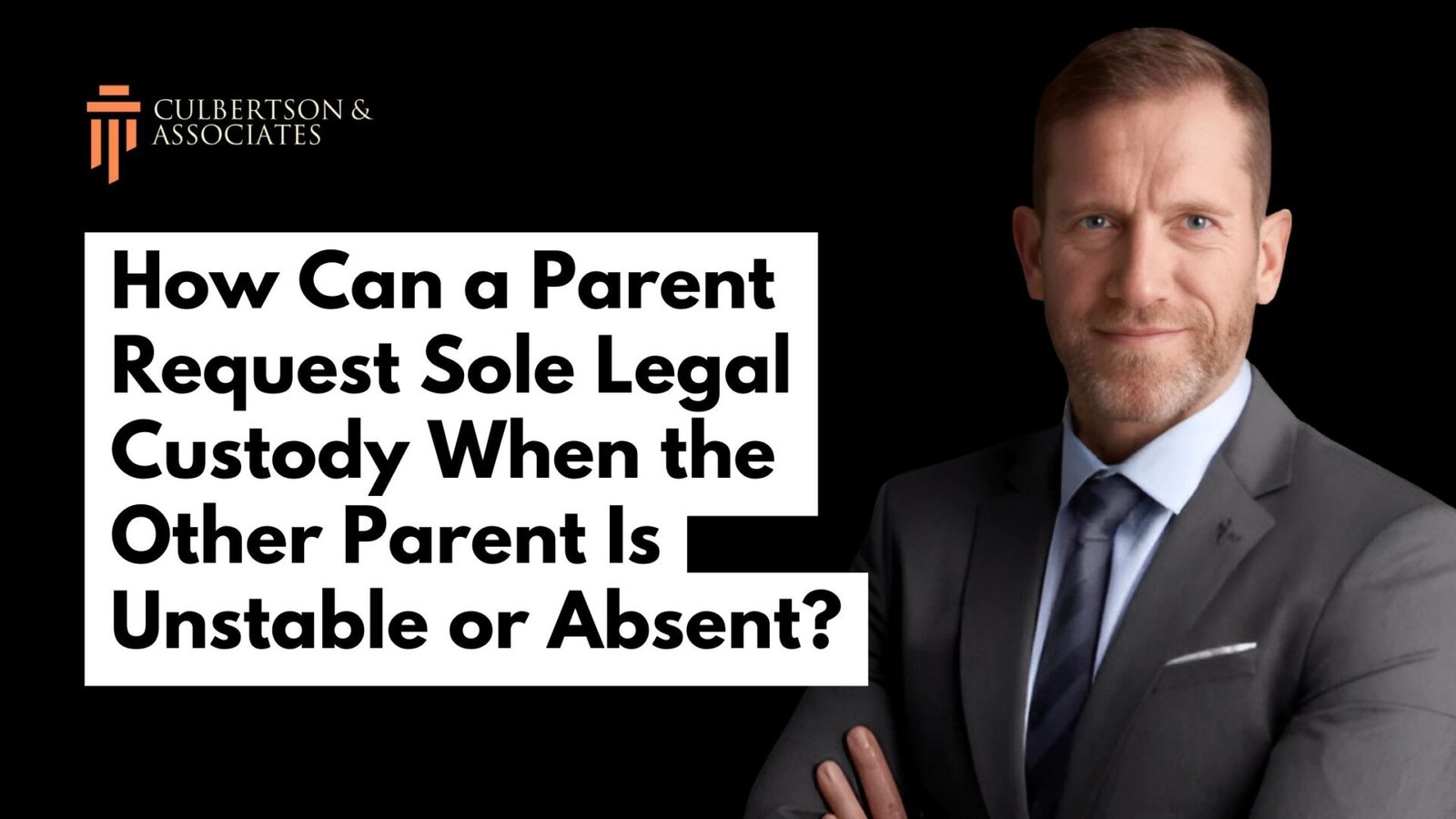How Can a Parent Request Sole Legal Custody When the Other Parent Is Unstable or Absent?

In North Carolina, a parent can seek sole legal custody by filing a custody case (or a motion to modify an existing order) and proving that exclusive decision-making is in the child’s best interests, especially where the other parent is unstable (e.g., violence, substance use, untreated mental illness) or absent. Courts apply the best-interest standard and may issue temporary or emergency orders when required; jurisdiction follows the UCCJEA if parents live in different states.
What “sole legal custody” means in NC (and how it differs from physical custody)
Legal custody is the right to make major decisions about education, non-routine medical care, and other significant issues. NC courts may award exclusive (sole) legal custody to one parent or joint legal custody to both, based on the child’s best interests and required written findings. Domestic violence and safety must be considered; courts can also order alcohol abstinence and continuous alcohol monitoring (CAM) when appropriate.
Physical custody controls where the child lives and the parenting schedule. You may have joint physical custody but sole legal custody, or vice-versa—NC treats these as separate questions in the order.
Learn more about types of child custody.
Step-by-step: How to request sole legal custody in North Carolina
Step 1) Confirm the right procedural path
- No order yet? File a Complaint for Custody in district court under G.S. 50-13.1.
- Already have an order? File a Motion to Modify and show a substantial change in circumstances affecting the child’s welfare since the last order (G.S. 50-13.7; case law elaborates the “substantial change” requirement).
- Multi-state issue? Verify NC has jurisdiction to make or modify orders under the UCCJEA (G.S. 50A-201).
Step 2) Build your evidence of instability or absence
Courts decide custody on best interests and must consider safety and domestic violence; orders require written findings. Persuasive proof includes missed medical/school decisions, non-participation in parenting, long gaps in contact, positive drug/alcohol screens, police/DSS/DVPO records, untreated mental-health concerns, and third-party corroboration. If alcohol misuse is an issue, request abstinence + CAM conditions under G.S. 50-13.2(b2).
Step 3) Seek temporary or emergency relief if risk is present
Judges can enter temporary custody orders and, in narrow circumstances, ex parte emergency orders before notice—but only if the court finds a substantial risk of bodily injury or sexual abuse or a substantial risk of removal from North Carolina to evade jurisdiction (G.S. 50-13.5(d)(3)).
If the child is imminently likely to suffer serious harm or be removed from NC, the court may issue a warrant to take physical custody under G.S. 50A-311, with a hearing set on the next judicial day after execution.
Step 4) Complete custody mediation (unless waived)
Most NC districts require participation in the Child Custody & Visitation Mediation Program before trial (waivers granted for good cause, e.g., DV). Agreements reached can be entered as court orders.
Step 5) Win the hearing (what judges look for)
The court awards custody to the person who will best promote the interest and welfare of the child; the order must include findings reflecting consideration of DV and safety. Where ongoing conflict, absence, or unsafe behavior blocks shared decision-making, the court can grant sole legal custody (exclusive decision authority) or joint with tie-breaker to one parent.
Step 6) Draft a precise, enforceable order
Spell out: which parent holds legal custody (and any tie-breaker rules), decision domains (healthcare, education, religion), information-sharing, required treatment or monitoring (e.g., CAM), and any supervised visitation conditions. Clear terms make contempt enforcement possible if violations occur.
Exactly what to file (practical checklist)
- Pleadings: Complaint (or Motion to Modify) asking for sole legal custody with facts supporting instability/absence; cite G.S. 50-13.2.
- Evidence packet: school/medical records, missed-exchange logs, texts/emails, third-party statements, DV/criminal records, substance-use proof; proposed CAM language if alcohol is an issue.
- Interim motions: Temporary custody; ex parte emergency only if you meet 50-13.5(d)(3); if removal/harm is imminent, seek a 50A-311 warrant.
- UCCJEA affidavit: Child’s residence history and jurisdiction facts for G.S. 50A-201.
- Mediation posture: Request waiver if appropriate; otherwise prepare a safe, child-focused plan consistent with sole legal custody.
Frequently Asked Questions
Is it hard to get sole legal custody in North Carolina?
Courts often start from joint decision-making when parents can co-parent, but they will award sole legal custody when evidence shows it better serves the child’s best interests, with written findings addressing safety and domestic violence.
Can I get sole legal custody if the other parent is absent?
Yes. File an initial custody action under G.S. 50-13.1 (or a modification under G.S. 50-13.7) and show why exclusive decision-making promotes the child’s welfare. Confirm jurisdiction under the UCCJEA (G.S. 50A-201) if a parent is out of state.
When will NC grant emergency custody without notice?
Only if the court finds a substantial risk of bodily injury, sexual abuse, or removal from NC; these are temporary and set for prompt hearing (G.S. 50-13.5(d)(3)).
What if alcohol misuse is part of the instability?
Judges may require abstinence and continuous alcohol monitoring (CAM) as a condition of custody/visitation; violations can be punished by contempt (G.S. 50-13.2(b2)).
How are NC custody orders enforced?
By civil contempt (to compel compliance) and criminal contempt (to punish willful disobedience). Orders can also provide make-up time and other remedies.
